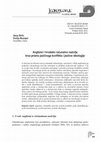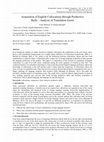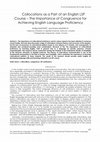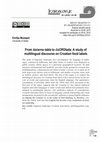Papers by Emilija Mustapić

Jezikoslovlje, 2012
Sveuþilište u Zadru Anglizmi i hrvatsko raÿunalno nazivlje kroz prizmu jeziÿnoga konflikta i jezi... more Sveuþilište u Zadru Anglizmi i hrvatsko raÿunalno nazivlje kroz prizmu jeziÿnoga konflikta i jeziÿne ideologije S obzirom na ubrzani razvoj raþunalne tehnologije, uþestalost i oblik anglizama na podruþju raþunalnoga nazivlja neiscrpan su predmet jezikoslovnih rasprava. Cilj je ovoga rada utvrditi eventualno postojanje i prirodu jeziþnoga konflikta izmeÿu engleskoga i hrvatskoga jezika na temelju analize uþestalosti uporabe anglizama i domaüih izraza koji þine sastavni dio raþunalnoga nazivlja. Takoÿer, analiza uporabe prilagoÿenih anglizama omoguüava donošenje zakljuþaka o legitimnosti jeziþnoga purizma kao jednoga od oblika jeziþne ideologije. Istraživanje ukljuþuje provoÿenje upitnika meÿu uþenicama i uþenicima odabranih osnovnih škola Zadarske županije. Na temelju rezultata istraživanja zakljuþujemo da je hrvatski jezik i "jezik identifikacije" i "jezik komunikacije", pri þemu se prevlast uporabe anglizama javlja u sluþajevima kada su u odnosu na istoznaþne domaüe izraze uporabno manje zahtjevni te u sluþajevima kada se smatraju uspješno prilagoÿenima sustavu hrvatskoga jezika. To je razlog zbog kojega identificiramo minimalni oblik ispitivanoga jeziþnog konflikta. S druge strane, s obzirom na broj varijanti koje predstavljaju prilagoÿene anglizme koji odstupaju od hrvatske pravopisne norme, zakljuþujemo da je jeziþni purizam koji se odnosi na inzistiranje na pravopisnoj normi, kao oblik jeziþne ideologije, razumljiv u umjerenom obliku. Kljuþne rijeþi: anglizmi; raþunalno nazivlje; jeziþni konflikt; jezik identifikacije; jezik komunikacije; jeziþni purizam; jeziþna ideologija.

International Journal of English Linguistics, 2015
Even though the number of studies focused on English collocations has proliferated in the past tw... more Even though the number of studies focused on English collocations has proliferated in the past twenty years, there is still considerable disagreement over a single unitary definition of collocations (Leśniewska, 2006, p. 1; Barfield & Gyllstad, 2009, p. 23), which is why the distinction between collocations, idioms and free word combinations is relatively blurry. Collocations play a major role in foreign language acquisition as they increase the language proficiency of the speaker. This paper is a continuation of the research on acquisition of English collocations as a part of an LSP course, conducted among the native speakers of Croatian in June 2013. The conducted analysis was intended to determine to what extent the general English language proficiency affects the knowledge of collocations in the LSP and how and to which extent the congruence of collocations affects the types of errors in translation tasks. Since the previous research showed that productive (translation) tasks pose a bigger challenge for language acquirers than receptive skills , this paper has provided a detailed analysis of translation errors. The results show a need for didactic improvements in terms of new teaching materials and exercises that would develop productive skills and facilitate acquisition of collocations, both in general language and language for specific purposes.

The importance of collocational proficiency and its various aspects has been attested in numerous... more The importance of collocational proficiency and its various aspects has been attested in numerous recent studies. Not only does the proper usage of collocations enhance fluency and accuracy of the speaker, but the lack of awareness of collocational patterns leads to over-reliance of L1 transfer, and consequently, to awkward and unnatural-sounding word combinations. Because of this, the importance of collocational proficiency for teaching English, both in general and as a language for specific purposes, remains unquestionable. This research will be conducted among the students of the Professional Studies of Hospitality at the Karlovac University of Applied Sciences. The fluency of intercultural communication is one of the fundamental prerequisites in the field of tourism and hospitality, which underlines the importance of teaching collocational patterns to these students. The results of this research should provide useful insights for developing language skills and teaching materials...

ELOPE: English Language Overseas Perspectives and Enquiries
The paper presents an overview of sign languages and co-speech gestures as two means of communica... more The paper presents an overview of sign languages and co-speech gestures as two means of communication realised through the visuo-spatial modality. We look at previous research to examine the correlation between spoken and sign language phonology, but also provide an insight into the basic features of co-speech gestures. By analysing these features, we are able to see how these means of communication utilise phases of production (in the case of gestures) or parts of individual signs (in the case of sign languages) to convey or complement the meaning. Recent insights into sign languages as bona fide linguistic systems and co-speech gestures as a system which has no linguistic features but accompanies spoken language have shown that communication does not take place within just a single modality but is rather multimodal. By comparing gestures and sign languages to spoken languages, we are able to trace the transition from systems of communication involving simple form-meaning pairings ...

Jezikoslovlje
The study of linguistic landscape (LL) encompasses the language of public signs, commercial billb... more The study of linguistic landscape (LL) encompasses the language of public signs, commercial billboards, and other forms of written texts displayed in public (mostly urban) spaces of a particular geographical location. Its dual function, informational and symbolic, provides fertile ground for research into multilingualism, a phenomenon prevalent in today’s society. LL is made up of both large-scale entities such as billboards, and smaller everyday items such as leaflets, posters, and food labels. The aim of this paper is to explore the multilingual discourse on Croatian food labels with a special focus on the advent of words and expressions from the English language. Our quantitative examination of chocolate labels from the 1960s until 2010, presented in the first part of the paper, suggests that the Croatian LL has indeed embraced English (and other languages to some extent) and shifted from primarily monolingual to multilingual practice. Our qualitative analysis of contemporary Cro...











Uploads
Papers by Emilija Mustapić